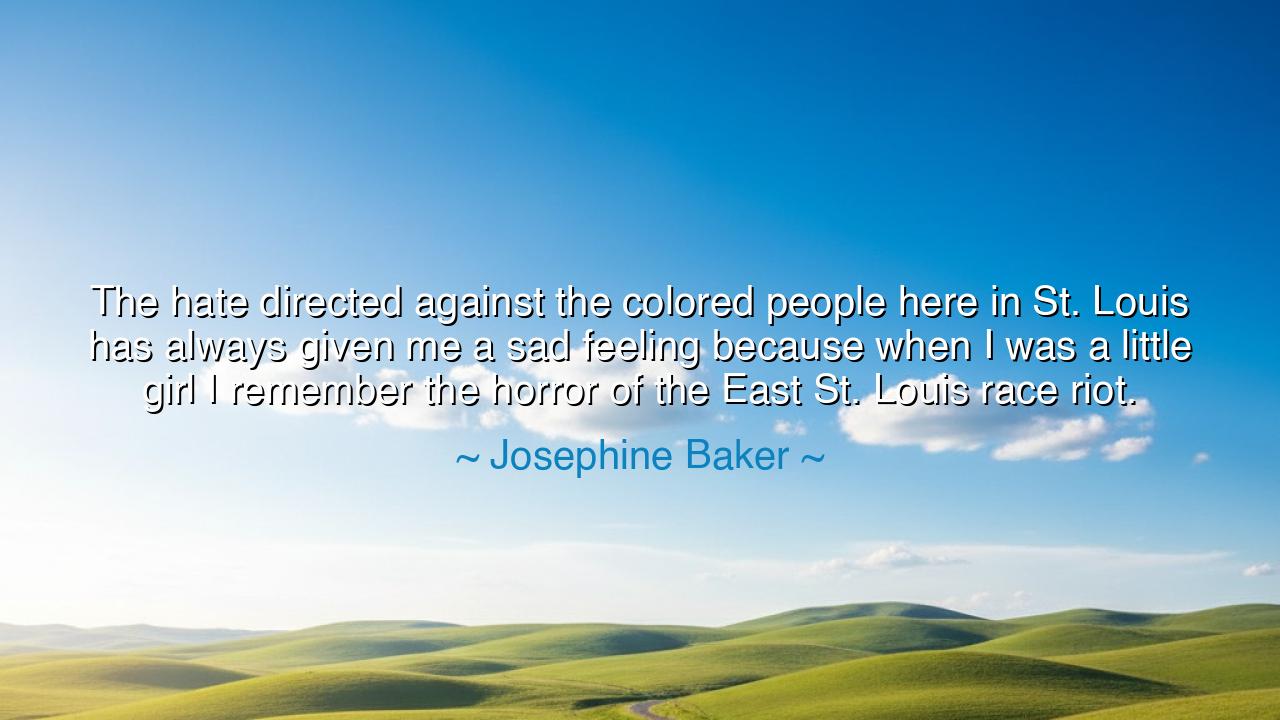
The hate directed against the colored people here in St. Louis
The hate directed against the colored people here in St. Louis has always given me a sad feeling because when I was a little girl I remember the horror of the East St. Louis race riot.






Hear the sorrowful words of Josephine Baker, the daughter of St. Louis who rose from poverty to become a star across the seas: “The hate directed against the colored people here in St. Louis has always given me a sad feeling because when I was a little girl I remember the horror of the East St. Louis race riot.” Within this memory there is both lament and warning, for she speaks not merely of her own grief, but of the wounds carved into the soul of a people. Her words summon the truth that hatred, when left unchecked, consumes both victim and perpetrator, leaving behind ashes where life should flourish.
The East St. Louis race riot of 1917 was not merely an outbreak of violence—it was a storm of cruelty, born of fear, resentment, and the poison of racism. Homes were burned, families were shattered, and countless lives were lost. A young Josephine Baker, only a child, beheld this nightmare with innocent eyes, and the vision remained with her all her days. Thus her words carry the weight of one who has seen the fire of hatred firsthand, and who knows its scars do not fade. It is the cry of memory turned into testimony.
Her sorrow is not private but shared. For every age, every people, has known the shadow of hate rising against the innocent. Think of the Jewish families driven from their homes in medieval Europe, the Armenians in their long march of death, or the countless enslaved who wept in chains across centuries. Each tale bears the same root: a refusal to see the humanity of the other, a blindness that breeds horror. Baker’s voice reminds us that history repeats when hearts remain unguarded against such darkness.
And yet, from her sorrow came also resilience. Josephine Baker fled the cruelty of America and found honor upon the stages of Paris. She danced not only with grace but with defiance, proving that the spirit of the oppressed could shine brighter than the chains of hatred. Later, she returned to the struggle for civil rights, lending her voice and her fame to the cause of justice. This, too, is part of her story—that the memory of riot and grief did not silence her, but ignited her resolve to fight against hatred wherever it appeared.
Her words thus carry a double weight: a remembrance of what has been, and a call to what must not be again. For hatred is not bound to one city, one people, or one century. It lurks always, waiting for hearts to grow cold and fearful. But so, too, does the power of remembrance stand as a shield. To remember the riot is to resist its return. To speak of sorrow is to plant the seed of compassion. Josephine Baker’s lament is therefore also an offering: a chance for others to learn from wounds not their own.
The lesson, O seeker, is clear: never allow hatred to be dismissed as natural, never allow injustice to pass unchallenged. The tears of children who witness cruelty may become the voice of history that judges us all. To honor their memory is to build a world where no child grows up under the shadow of riot or the stench of burned homes. We must turn remembrance into vigilance, and vigilance into action.
Practical is this counsel: speak against hate wherever it is found, whether in whispers or in shouts. Teach the young not only the triumphs of history, but also its tragedies, so that they may learn to guard the dignity of every human soul. Support the oppressed, listen to their stories, and let those stories shape your conscience. For the silence of the bystander feeds the fire of cruelty, but the courage of the witness quenches it.
Thus Josephine Baker’s voice reaches across time: “The hate directed against the colored people… always gave me a sad feeling.” It is not only her sorrow, but ours to bear, lest we forget. Let us then take her words as sacred memory and sacred charge—to remember the horror, to heal the wounds, and to ensure that no generation need again speak of such grief as its own.






AAdministratorAdministrator
Welcome, honored guests. Please leave a comment, we will respond soon